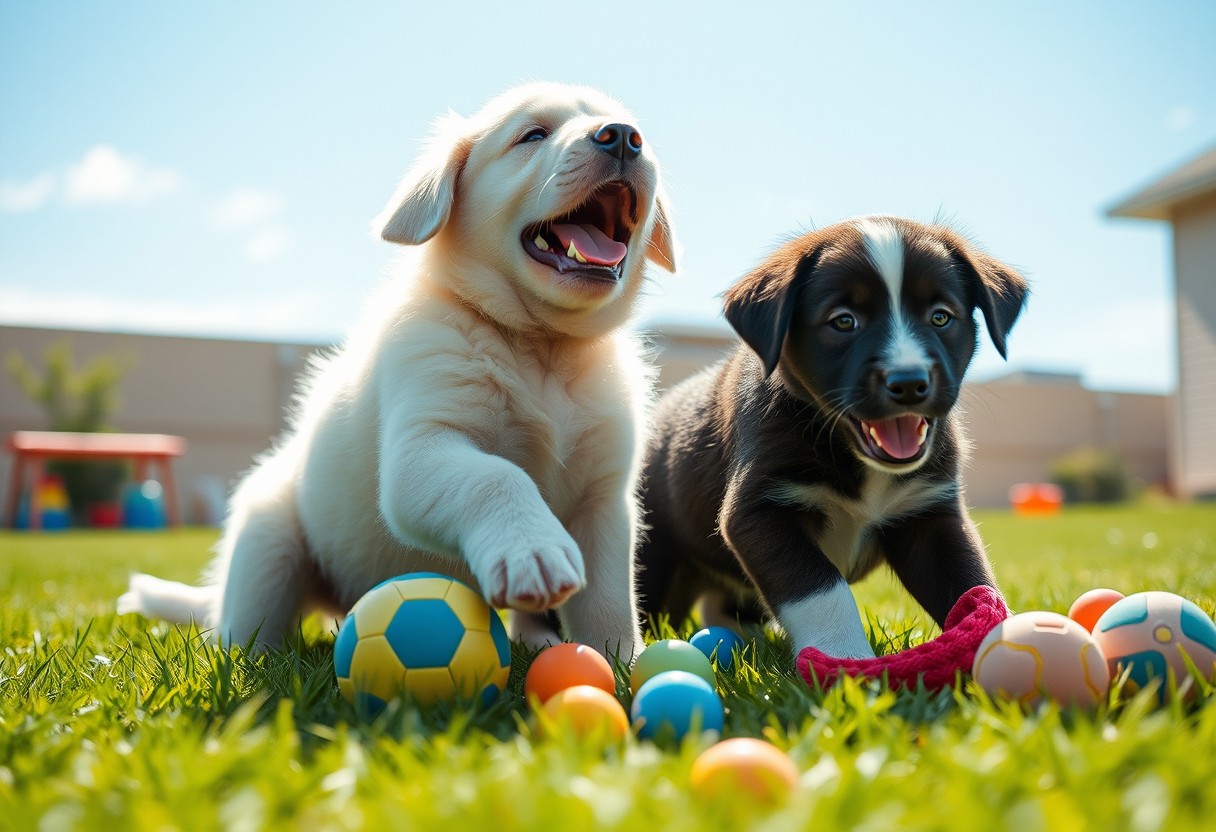Great Pyrenees Lab Mix Puppies – 6 Things to Expect

Many prospective dog owners are drawn to the lovable and unique Great Pyrenees Lab Mix puppies due to their friendly nature and striking appearance. In this blog post, you will discover 6 imperative aspects to consider when bringing one of these puppies into your home. From their size and energy levels to grooming needs and temperament, understanding what to expect can help you provide the best environment for your new furry friend. Get ready to learn how to raise a well-adjusted and happy Great Pyrenees Lab Mix puppy!
Key Takeaways:
- Temperament: Great Pyrenees Lab Mix puppies typically exhibit a friendly and gentle nature, making them great family pets.
- Exercise Needs: These puppies require regular exercise to stay healthy and happy, as they are energetic and active dogs.
- Grooming Requirements: Expect moderate to high grooming needs due to their mixed coat, which may inherit characteristics from both parent breeds.
Overview of the Great Pyrenees Lab Mix
While the Great Pyrenees Lab mix, often affectionately referred to as the “Great Lab,” combines the best traits of its parent breeds – the gentle and protective Great Pyrenees and the friendly and energetic Labrador Retriever. This mix typically results in a loyal and loving companion that excels in family environments, making them a popular choice among pet lovers. You’ll likely find that their friendly disposition and need for companionship make them well-suited to active households.
History and Background
After centuries of serving as herding dogs in the Pyrenees mountains, the Great Pyrenees was bred for its protective nature and ability to work alongside livestock. The Labrador Retriever, originally bred for hunting, has been a beloved family companion since the 19th century. The combination of these two breeds has created a lovely mix that is both loyal and playful.
Physical Characteristics
Behind their charming personalities, Great Pyrenees Lab mix puppies can vary in size but typically inherit a sturdy build from both parents. You can expect them to weigh anywhere from 50 to 90 pounds and stand between 21 to 32 inches tall at the shoulder. Color patterns can range from solid black, yellow, or chocolate to beautiful fluffy coats that often bear the white and tan markings of the Great Pyrenees. (Choosing the right breed for your lifestyle is vital.)
This mix primarily showcases the darker coat and playful nature of Labs combined with the robust and fluffy appearance of the Great Pyrenees. Their coats may require regular grooming to manage shedding and maintain a healthy sheen. You should also prepare for varying energy levels; while puppies may be quite spirited, as they mature, their temperament tends to balance between playfulness and calmness. (Understanding these characteristics can help you create a more harmonious home.)

Temperament and Behavior
It is important to understand that Great Pyrenees Lab Mix puppies possess a unique temperament influenced by both parent breeds. You can expect them to be gentle, loyal, and protective while also energetic and playful. Their balance between calmness and enthusiasm makes them suitable for various environments, including families with children and active individuals seeking companionship.
Friendly and Social Traits
After bringing home a Great Pyrenees Lab Mix puppy, you’ll likely be pleasantly surprised by their friendly and sociable nature. These pups typically possess a great affinity for people and other pets, making them enjoyable companions who thrive in social settings.
Training and Intelligence
An important aspect to consider when raising a Great Pyrenees Lab Mix is their intelligence and trainability. This mix generally inherits a strong work ethic, making them more receptive to training compared to other breeds. (Choosing positive reinforcement techniques will yield the best results.)
Another significant point about training your Great Pyrenees Lab Mix is their potential for independence and stubbornness. This might require you to practice consistent and patient training methods, as early socialization and obedience training are vital for your puppy’s development. (Establishing a routine will help them adapt more effectively.)
Health Considerations
Unlike some mixed breeds, Great Pyrenees Lab mix puppies can inherit various health concerns from both parent breeds. Genetics play a significant role in your puppy’s health, so being aware of potential issues can help you provide better care. Adoption of a responsible breeding practice can mitigate some of these risks, ensuring a healthier puppy.
Common Health Issues
To keep your Great Pyrenees Lab mix in optimal health, be aware of common health issues such as hip dysplasia, obesity, and certain skin conditions. These issues can arise from genetics or environmental factors, and recognizing early signs is vital for effective treatment.
Regular Veterinary Care
At the core of maintaining your puppy’s health is consistent veterinary check-ups, which should ideally begin during the first few months of life. Ensure they receive vaccinations and preventative care, as this can significantly influence their long-term well-being. (Choosing a vet that specializes in mixed breeds can greatly improve care.)
A regular veterinary routine is vital for monitoring your Great Pyrenees Lab mix’s development, vaccinations, and overall health. This includes routine examinations that can help detect any signs of health issues early. Routine care helps to address serious concerns before they develop into more significant problems, enhancing your puppy’s lifespan and quality of life. (Prioritize finding a veterinarian who understands the specific needs of your breed mix.)

Exercise and Activity Needs
Not meeting the exercise and activity needs of your Great Pyrenees Lab mix can lead to behavioral issues and health problems. These dogs are known for their energy levels and require a consistent daily routine that includes physical and mental stimulation. Engaging in regular activities will help keep them happy and healthy, and it fosters a strong bond between you and your furry companion.
Daily Exercise Requirements
After bringing home your Great Pyrenees Lab mix, you should plan for at least 60-90 minutes of exercise each day. This includes activities like brisk walking, running, or even hiking. Variability in your routine can prevent boredom for both you and your puppy, ensuring they remain active and engaged.
Ideal Play Activities
Around your Great Pyrenees Lab mix, you’ll find that they thrive in interactive play sessions. Incorporate activities like fetching, tug-of-war, or even agility training to stimulate their minds and bodies. These enjoyable experiences will help in building a strong bond with your dog, while providing them the necessary outlet for their energy.
Exercise is vital for your Great Pyrenees Lab mix, as it prevents destructive behavior that can arise from pent-up energy. Incorporating mental stimulation through training sessions or puzzle toys can complement their physical exercise. Activities that promote social interaction, such as visiting dog parks or arranging playdates with other dogs, will also enhance their social skills. By making exercise and play a central part of your daily routine, you’ll ensure your pup is both healthy and happy.
Dietary Requirements
Now that you have your Great Pyrenees Lab Mix puppy, understanding their dietary requirements is vital for their growth and wellbeing. This hybrid breed has a unique combination of traits from both parent breeds, leading to specific nutritional needs that will support their health and energy levels as they develop.
Nutritional Needs
An appropriate diet for your puppy should include a balanced combination of proteins, fats, and carbohydrates, alongside necessary vitamins and minerals. It is important to select a food that supports their large size and energetic disposition, ensuring they receive the nutrients needed for healthy muscle and bone growth.
Choosing the Right Food
Behind your decision lies the importance of selecting high-quality dog food that meets AAFCO standards for growth (a significant factor in your puppy’s health). Dry kibble, wet food, or a balanced homemade diet can all be suitable, but it’s necessary to prioritize protein and fat sources for your puppy’s overall vitality.
Indeed, you should consider consulting with your veterinarian to ensure your Great Pyrenees Lab Mix receives the right nutrients necessary for optimal development and health. Selecting the right food is an impactful decision that will influence your puppy’s energy levels, coat quality, and overall health. Additionally, keep in mind potential allergies or sensitivities that may develop as your puppy matures, thus impacting their diet choices in the long run.

Preparing for Your New Puppy
Despite the excitement that comes with welcoming a Great Pyrenees Lab Mix puppy into your home, preparation is key to ensuring a smooth transition. Planning ahead helps you provide a safe and comfortable environment for your new furry friend, setting the stage for a loving and well-adjusted pet. Investing time in preparation will help you avoid common pitfalls and enhance the bonding experience with your puppy.
Essential Supplies
Below, you’ll find a list of important supplies to have ready before your new puppy arrives, including a sturdy leash, a comfortable bed, and puppy food. (Choosing the right food for your puppy’s age and dietary needs is paramount.) Those supplies will ensure that all of your puppy’s basic needs are met from day one.
Adjusting Your Home
On top of gathering supplies, adjusting your home to accommodate your new puppy is important. (Creating a safe play area can help prevent accidents and ensure your puppy feels secure.) This means removing hazardous items, securing cords, and establishing a designated space for your puppy to relax.
Supplies like sturdy gates can help in creating safe zones, while removing small objects reduces the risk of ingestion. You should also consider designating areas for feeding and bathroom breaks and familiarize your puppy with these spaces early on. Consider implementing a consistent schedule, which helps acclimate your puppy to their new home and routine more quickly.
Conclusion
Presently, as you commence on the journey of raising Great Pyrenees Lab Mix puppies, you can anticipate a unique blend of characteristics and personality traits that make this mix truly special. Understanding their energy levels, grooming needs, and training requirements will ensure a harmonious relationship between you and your new companion. For more in-depth insights on similar mixes, check out Great Pyrenees Black Lab Mix – Is This Mix Fabulous, Or A …. By being well-informed, you will pave the way for a happy and healthy life together.
FAQ
Q: What is the temperament of Great Pyrenees Lab Mix puppies?
A: Great Pyrenees Lab Mix puppies typically inherit a combination of traits from both parent breeds. Generally, you can expect these puppies to be friendly, gentle, and affectionate. They often form strong bonds with their families and are good with children. Socialization is important to ensure they develop into well-adjusted adults, so early introduction to various people, pets, and environments is important.
Q: How much exercise do Great Pyrenees Lab Mix puppies need?
A: These puppies are usually energetic and require regular exercise to keep them healthy and happy. As a mix of the Great Pyrenees and Labrador Retriever, they benefit from various activities like daily walks, playtime in a secure yard, and interactive games. Aim for at least 1 hour of moderate exercise each day to help them burn off energy and promote good behavior.
Q: What are common health issues in Great Pyrenees Lab Mix puppies?
A: Like any mixed breed, Great Pyrenees Lab Mix puppies can be prone to health issues inherited from their parent breeds. Some common concerns include hip dysplasia, elbow dysplasia, and certain skin conditions. Regular veterinary check-ups, a balanced diet, and proper exercise can help mitigate some health risks and keep your puppy thriving. Additionally, responsible breeding practices can improve the likelihood of a healthier puppy.





